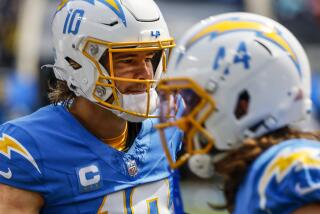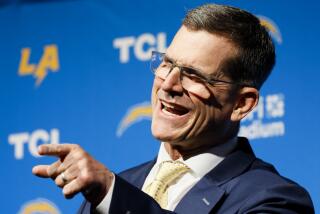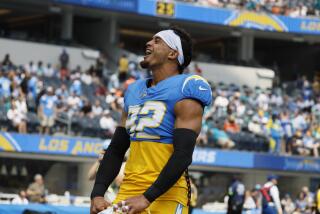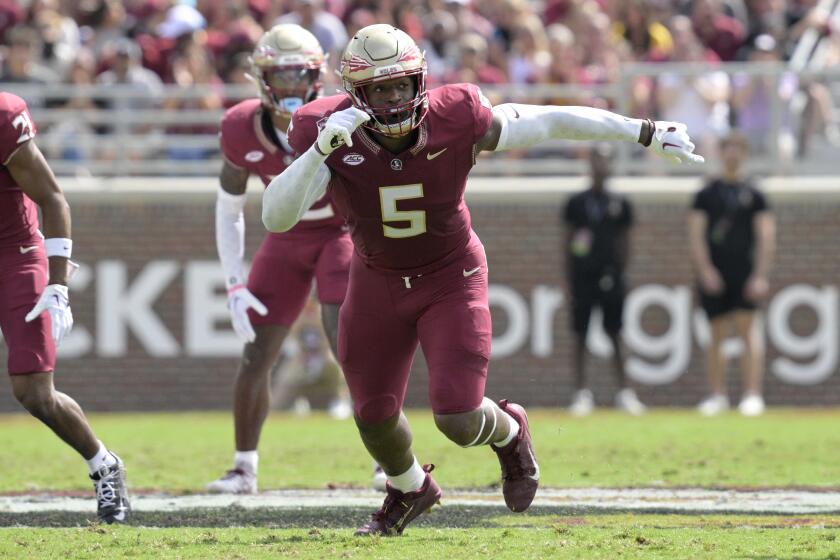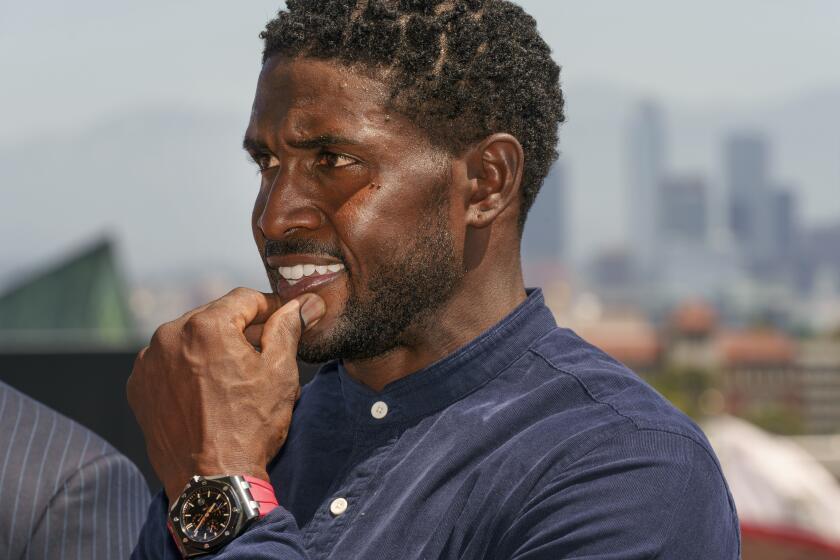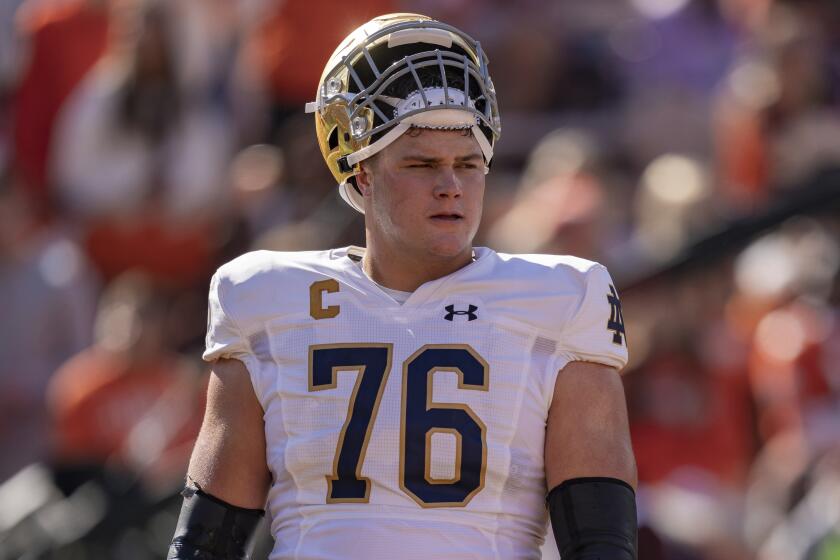Toughness runs in the family of Chargers safety Bob Sanders
The most important bit of film study for Bob Sanders didn’t come when he was preparing to face the Chicago Bears in Super Bowl XLI, or the year he was named the NFL’s defensive player of the year.
It was when his father brought home a video from the steel mill in Erie, Pa., footage of Marion Sanders swinging a 20-pound sledgehammer the way he did working those 171/2 -hour shifts for more than 30 years.
“Every week he’d always say, ‘Get your education and make sure you work hard so you won’t be doing what I’m doing,’” the son recalled this week after San Diego Chargers practice. “He made a video and brought it home. He showed us the video and said, ‘I don’t want you doing this.’”
In some respects, Bob Sanders wound up swinging a hammer anyway. He rounded into one of the hardest-hitting NFL safeties of his generation, a scheme-altering player who — when healthy — can help elevate the play of an entire defense, just the way he did with the Colts.
“The way he could cover ground, disguise blitzes, stop the run, stop the pass — he’s the best I’ve ever seen,” said Chargers backup quarterback Billy Volek, who, when he had that role in Tennessee, prepared to face Sanders twice a season.
The video didn’t lie.
“Even if he didn’t have a number on his jersey, you could see him,” Volek said. “Every time there was a pile, Bob Sanders was getting out of it.”
It’s not as if Sanders, 30, went from the pile to the scrap heap, but the Colts had to let him go. Once the highest-paid safety in NFL history, he simply couldn’t stay healthy. Injuries to his knees, ankles and arms kept him in the training room more than he was on the field.
Sanders was released in February after playing in nine games over the last three seasons, a painful parting with the franchise that knew him as “The Eraser,” a player so smart and efficient — the defense’s answer to Peyton Manning — that he could erase the mistakes of out-of-position teammates.
At 5 feet 8, Sanders is usually the shortest player on the field. He’s also unbelievably strong and so sculpted it’s as if he stepped off the pages of a superhero comic book.
“Kind of the running joke around here,” Volek said, “is even when we do a walk-through with our jerseys on, it looks like he has shoulder pads on.”
The mere threat of a lurking Sanders can change the approach of an offense.
“Guys like that, your line is kind of peeking where he’s at, your quarterback is peeking where he’s at,” Chargers receiver Vincent Jackson said. “Because he can disrupt the running plays at any given point.”
And of course the receivers snap to attention.
“You see a guy like that on film when you’re preparing all week,” Jackson said. “When they’re coming downhill at 100 mph, that’s something that shows up on film. So once you get in the game, it’s not even like you need to get hit once or twice. You’ve seen the film on him. Already, you’ve got your head on a swivel.”
After the lockout, Sanders signed a one-year deal with the Chargers. He says he feels better now than he has in years, fresh after sitting out last season because of a torn biceps.
“I feel really good,” he said. “This is the best I’ve felt in so long. I’m excited, man. This is going to be a good year. [Coach Norv Turner] has said he’s going to do whatever it takes for me to be healthy. The plan is working so far.”
When it comes to pain tolerance, Sanders learned from the best. He can’t remember his father ever missing a day of work, even after his thumb was crushed by that sledgehammer.
“He came home one day and his thumb was bent in three different places,” Sanders recalled. “He had tried to pound something down with the sledgehammer and he hit his hand. Shattered his whole thumb. Never took the day off. Never complained. To this day, that thumb is still bent in those three places.”
Bob Sanders is the second youngest of eight children, and there wasn’t much money to go around. That’s why he was so sheepish when, at 12, he asked his dad if he could play Pop Warner football. His dad never played football but once dreamed of being a prizefighter.
“It was like $25 to sign up, and I didn’t want to ask him because of the money,” he said. “I didn’t even think we had it. But when I went and asked him, he smiled and said, ‘Oh, I’ve been waiting for that. Absolutely. Let’s sign up today.’
“That’s probably the happiest I’ve ever seen him in my life.”
Sanders said his mother, Jean, was somewhat less enthusiastic. She was worried about her son, who showed signs of playing with the same reckless abandon he does now.
“My mother never showed up to a game until I was in high school,” he said. “She was always afraid of me getting hurt. She wouldn’t look for a long time. She would always turn away when I was out there. Then when I’d be on the sidelines, she’d be staring at me.”
Somehow, his mom learned to cope with the possibility that her son could be hurt — as he has been, repeatedly — and Sanders has learned to deal with the frustration of so much watching from the sideline.
“That was the Lord’s plan for me, and that’s fine,” he said. “I’ve grown up so much through that time. People don’t realize that when you’re injured and you can’t do certain things, it can be a struggle. Some people wouldn’t have come back. Some people wouldn’t have trained hard. Some people would have given up. I didn’t give up.”
Like father, like son.
More to Read
Get our high school sports newsletter
Prep Rally is devoted to the SoCal high school sports experience, bringing you scores, stories and a behind-the-scenes look at what makes prep sports so popular.
You may occasionally receive promotional content from the Los Angeles Times.
